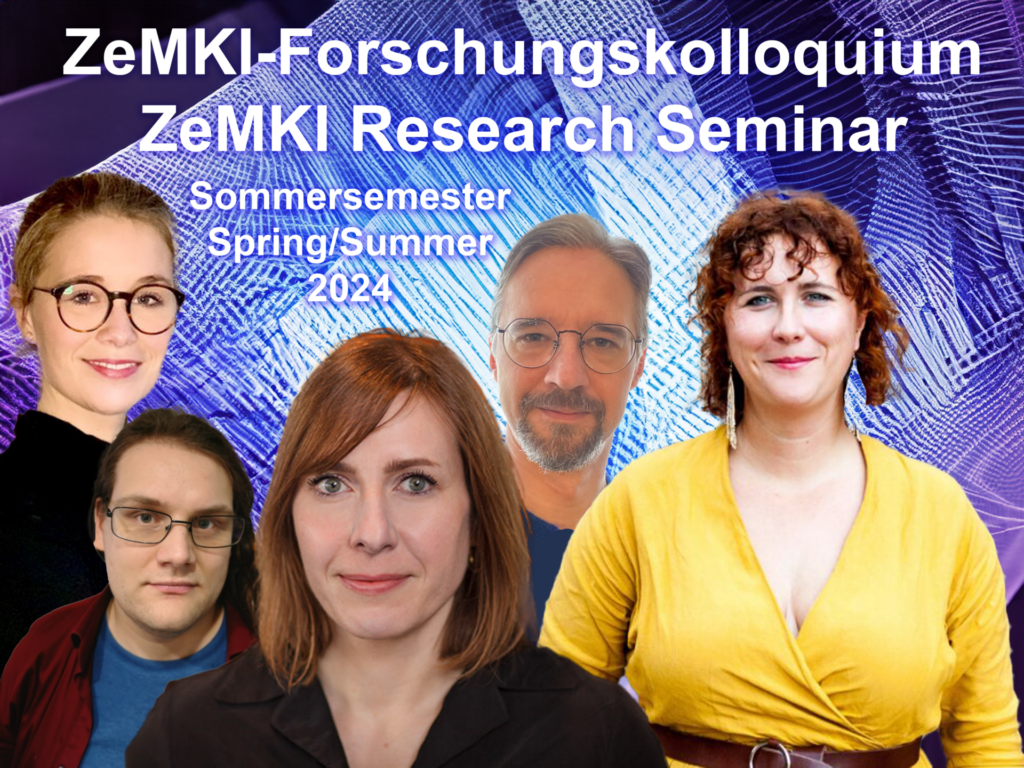
ZeMKI Forschungskolloquium Sommersemester 2024
16. April 2024
Auch in diesem Semester führt das ZeMKI die Veranstaltungsreihe der Forschungskolloquien fort. Eingeladen sind fünf Kommunikations- und Medienwissenschaftler*innen aus Finnland, Italien Deutschland und Schweden, die mit einem Vortrag einen Einblick in ihre Forschung geben.
Die Vorträge:
Dr. Matti Nelimarkka (University of Helsinki, Finland): Navigating the Visual Turn in Digital Media:
Methodologies and Challenges for Visual Big Data
08.05.2024, 16.15 – 17.45 (CET)
Matti Nelimarkka leads the Helsinki Social Computing research group, where he combines social science theory and ideas with tools and approaches adapted from computer science research, such as prototyping, coding, user centric design and, machine learning. His work focuses on two thematical areas: Computational Social Science and Data Science and Digital Democracy. He currently works at the Centre for Social Data Science, University of Helsinki.
Prof. Dr. Nicola Righetti (University of Urbino Carlo Bo, Italy): Coordinated Behavior on Social Media: Concepts and Tools
15.05.2024, 16.15 – 17.45 (CET)
Nicola Righetti is an Assistant Professor in the Department of Communication Sciences, Humanities, and International Studies at the University of Urbino Carlo Bo, where he teaches Digital Methods. Previously, he was a postdoctoral researcher at the University of Vienna and an associate researcher at the Computational Communication Science Lab at the same university. He obtained his PhD in Sociology and Social Research at the University of Verona, Italy.
Katharina Hajek (LMU Munich & UdK Berlin, Germany): Constructing a Climate of Compliance –
Understanding Resistance to Pro-Environmental Messages
29.05.2024, 16.15 – 17.45 (CET)
At the interface between social psychology and communication sciences, Katharina Hajek researches how individual freedoms and their restrictions shape actions and influence political motivations. In particular, she examines the effects of these influences on different public spheres and especially on social media. In addition to resistance dynamics, she is also interested in emotion psychology, in particular the question of ‚Be-longing in Wicked Times‘. She is currently working on her doctorate at the Berlin University of the Arts on the topic of reactance as an emotional process. She was previously funded by the Stiftung der Wirtschaft (sdw) and is now working as a project member in a bidt project at the LMU Munich. Parallel to her dissertation, she was a scientific advisor to a start-up that combines data science and emotion psychology. She was also spokesperson for the DGPuK’s Network for Young Political Communicators (NaPoKo). In 2022, she was a Research Fellow at the Center for Science, Technology, Medicine, & Society at the University of California, Berkeley. Prior to her academic work, she worked for six years as a communications manager in the field of mental health at a non-profit foundation.
Prof. Dr. Anne Kaun (Södertörn University, Sweden): Vanishing Act –
An Ethnography of Digitalization and the Disappearance of Printed News
26.06.2024, 16.15 – 17.45 (CET)
Anne Kaun is Professor at the Department of Media and Communication Studies, Södertörn University, Sweden, and a Wallenberg Academy Fellow studying the democratic implications of automated decisions making, artificial intelligence and digitalization more generally in the welfare sector.
Dr. Julia Borst (University of Bremen): How and Why Do Literary Scholars Study Websites? – Insights into a Research Project on Afroeuropean Activism in the Digital Space
03.07.2024, 16.15 – 17.45 (CET)
Julia Borst is a postdoctoral researcher and second speaker of the Institute for Postcolonial and Transcultural Studies (INPUTS) of U Bremen. She is the principal investigator of the ERC Starting Grant project AFROEUROPECYBERSPACE (101110473) and awardee of the Heinz Maier-Leibnitz prize 2021. PhD in Romance studies / literary studies of U Hamburg.

